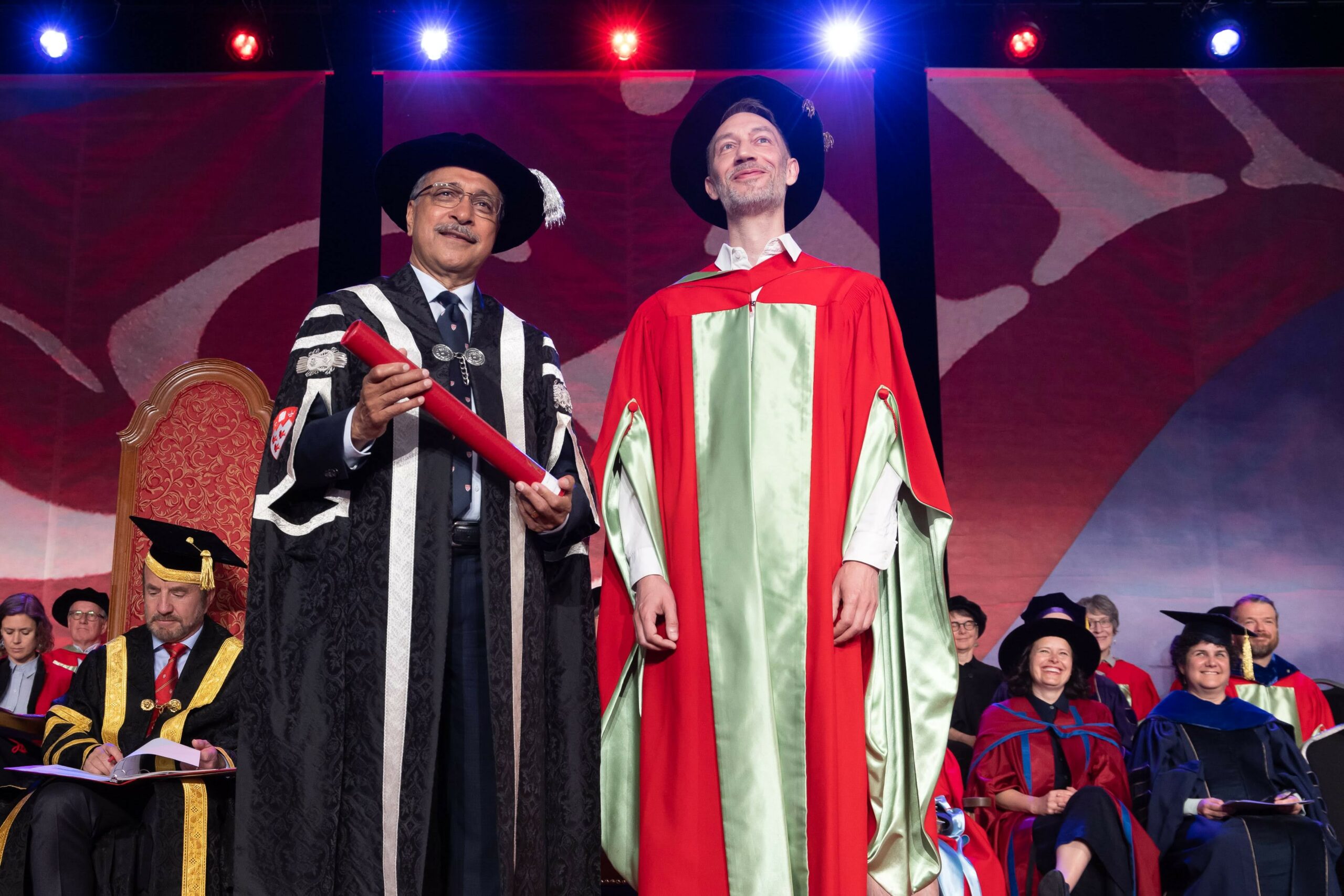
On the first day teaching his Introductory Latin course, Martin Sirois always asks his students: “What are you doing here?”
“It’s a genuine question,” he says. “What are you doing here in 2023?” His students offer many reasons, professional, academic, and personal. “The ancient world resonates, even subliminally, with our modern world in so many ways,” Sirois says. “Whether on the historical, linguistic, literary, or philosophical levels, it’s always there. Antiquity is for everyone, everywhere, all the time.”
That passion for the classics is one reason why Sirois was honoured with the Principal’s Prize for Excellence in Teaching (Faculty Lecturer category) as part of the morning Faculty of Arts convocation ceremony on June 6. Another is the empathy he shows for his students. As a teacher of Latin and ancient Greek, he knows classics courses can be “intense” and most of his students are encountering the ancient world for the first time. Student evaluations credit his good-natured openness for questions, comments, and discussion.
“The most beautiful and satisfying moment for me is when students simply raise their hands,” says Sirois, a Senior Faculty Lecturer in the Department of History and Classical Studies. “It means they are processing the material and making connections, not only with aspects of the ancient world, but also with their own modern reality.”
Hooked on the Classics
Sirois came to the study of the classics almost by accident. While in CEGEP studying science and planning to pursue a degree in cellular biology, he took a few electives “out of sheer curiosity” — English translation, North American literature, and an introduction to German.
Realizing he had a knack for languages and an interest in literary analysis, he signed up for a BA in Classics at the Université de Montréal. He recalls his first courses: an introduction to ancient Greek, ancient religion, and a survey of Roman literature. “I was hooked right away!”
Sirois went on to complete his master’s with a thesis on Homer’s Iliad, and then a PhD at Princeton University, where he continued his training in Greek, Latin, and Classical Studies.
He’s never looked back. “That change of trajectory has been the best decision for me,” says Sirois. “And now, I get to teach and keep learning about antiquity. It’s a never-ending process, which remains to this day both intellectually nourishing and professionally stimulating.”
Students “like being pushed”
At McGill for the past 11 years, Sirois still gets the jitters on the first day of every semester. “I get to meet a different group of young adults, all ready and eager to learn, and excited — or worried! — about the challenges coming up.”
Known for his tough quizzes (which account for 75 percent of the course grade), Sirois acknowledges that he expects a great deal of his students. “I always tell them, everything said in class is fair game for the quizzes. Then, at the first quiz, they realize that’s true!” His aim is simply to encourage his students to do their best.
“They like being pushed,” he says of McGill students. “I see they have the potential. They just need to be pushed to continue and do better.” Introductory Latin courses at McGill routinely attract 100 students every fall semester.
New technology vs ancient world
Sirois manages to juggle the rigorous nature of the subject matter with a healthy sense of humour. He gets a chuckle out of a comment he often overhears upon entering the classroom on the first day. “It’s something like ‘I wasn’t expecting that sort of teacher.’ I always find that funny — as if I needed to grow a long white beard and wait for many more wrinkles to properly teach the ancient world.”
How will new technologies such as ChatGPT affect his teaching of that ancient world? Sirois acknowledges this is uncharted territory for students and instructors alike. In true classical form, though, he posits there could be some interesting possibilities. For example, ask ChatGPT to write a dialogue between two philosophers, such as Socrates and Epicurus, on a specific topic. Students would then be assigned to criticize the arguments and evaluate how accurately they reflect (or distort) the philosophers’ actual views as expressed in the ancient texts.
“This kind of exercise would reinforce one of the main objectives of history, which is to develop analytical and critical abilities when confronted with different sources,” says Sirois.
His greatest satisfaction comes from seeing his students push their analysis one step further, questioning and challenging their assumptions about both the ancient and the modern worlds.
“The best reward for me is to hear: ‘I hadn’t thought of it that way before!’ This is the basis of all critical thinking.”
